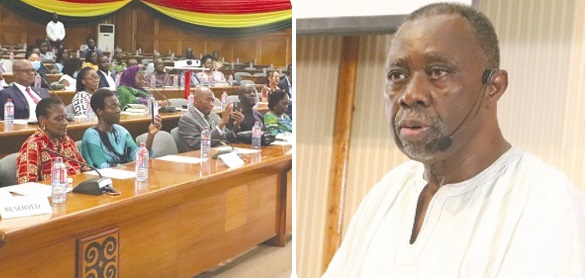
Ghana Compact launched
The African Centre for Economic Transformation, a Pan-African think tank, has launched the Compact for Ghana’s Political and Economic Transformation (Ghana Compact).
The Ghana Compact is a consensus-building initiative that seeks to set well-articulated and collectively agreed goals and targets for the country’s governance, political processes, economic management and policies of inclusion for the second quarter of the 21st century.
Advertisement
It will also set long-term targets that will lead to the achievement of gender equality and major improvement in the social sector — health, education and skills development — and also a long-term vision for economic transformation and a strong system that will ensure that leaders stick to the plans to lead the country.
The Ghana Compact, which is an initiative of the Founder and President of the African Centre for Economic Transformation, Dr K.Y. Amoako, has 11 partners, including the Ghana Centre for Democratic Development, the Institute for Fiscal Studies, the Institute for Democratic
Governance the IMANI Centre for Policy and Education, the Afrobarometer and NETRIGHT.
The rest are the Integrated Social Development Centre, the West Africa Civil Society Institute, the Youth Bridge Foundation, the Ghana Federation of Disability Organisations and Right to Play.
Focus
Among other things, the compact will be an agreement between the citizenry and the government on the development direction of the country, regardless of the party in power.
The initiative, which will set a clear and collective vision for Ghana through to 2050, will focus on four critical areas that can help unlock its progress towards economic transformation.
The four areas include political and economic transformation that will help end extreme political division and polarisation, policies that will lead to improvement in the country’s fiscal health to unlock greater and more responsible investment in national development, a long-term vision for economic transformation and a strong system that will ensure that leaders adhere to collectively agreed goals, as well as long-term targets that will improve gender equality, access to affordable high quality health service and education.
Speaking via a pre-recorded video at the launch of the compact, a former Special Representative of the UN Secretary General for West Africa and the Sahel, Dr Mohammed Ibn Chambas, said the country remained a leader in African stability and governance, despite its economic crisis that had sent it back to the International Monitory Fund (IMF) for the 17th time in three decades.
He said to step up Ghana’s transformation, "the time is now to correct course and turn our fortunes around".
"We must recalibrate our systems and approaches to make them smart and responsive to the times," he added.
Democratic governance
Dr Chambas expressed the hope that the Ghana Compact would be a template for states across Africa to address the deficit in democratic governance and persistent poverty and socio-economic challenges which had existed for more than 60 years.
Over the past year, he said, he had supported Dr Amoako and his colleagues as they sought to fashion out the Ghana Compact.
“I personally participated in some of the consultations with a wide range of stakeholders, public and private, the government and Parliament, political parties, civil society groups, think tanks, leaders of thought, labour leaders, the media, cultural activists,” he said.
Agreement
Providing further details on the Ghana Compact, Dr Amoako said it would be an agreement on ways to address the country’s most pressing challenges head-on by bringing more voices to the table and putting policy before politics.
“It will be an agreement on the values we want to uphold as a nation. These are lofty goals, but they are not unattainable. We need a new approach and new solutions to create the Ghana we want.
“The compact will bring us closer to these solutions. It has concrete ideas, committed collaborators and a clear way forward, but the time to act is now,” he said.
To be successful, he said, there was the need for the commitment of all Ghanaians — regardless of background, religion, political party, age, or gender.
“It will need selflessness; it will need compromise,” he added.
Youth perspective
Presenting a youth perspective on the compact, a member of the Northern Regional Youth Network, Radia Isshaku, said with the launch of the compact, the country would have a development plan that prioritised accountable, inclusive and transparent governance.
“Today sets a new vision for our nation that will transform the lives of future generations, with the launch of the Ghana Compact,” she said.




